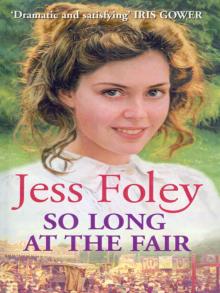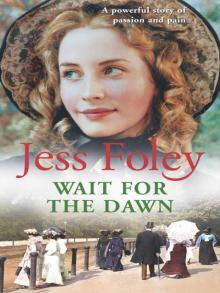- Home
- Jess Foley
Wait For the Dawn Page 2
Wait For the Dawn Read online
Page 2
‘Hello, Lyddy,’ she said, smiling warmly, and then turned to Mr Halley. ‘Good morning, sir.’ Her smile of greeting to Lydia’s father was tentative, for she had never been at ease with him.
While Lydia responded with smiling words of greeting for her friend, Mr Halley gave a nod and a cool smile. ‘Evie,’ he murmured. ‘And how are you this morning?’
‘Very well, thank you, sir.’ Evie turned then to Lydia. ‘Shall I see you later, Lyddy?’
‘Yes,’ Lydia nodded, ‘I’ll call round for you this afternoon, shall I?’
‘Yes. If it stays fine we can go for a little walk if you like.’
They parted then, and Lydia and her father passed through the gates into the lane. As they turned their steps in the direction of home, two or three of the other villagers murmured good mornings to them. Lydia returned the words of greeting pleasantly, but when her father responded his smiles rarely reached his eyes. For the most part he held many of the other villagers in contempt, despising them for their lifestyles which he saw as loose – and even those who regularly attended church services he somehow managed to see as hypocrites. For the most part, only those who came to his own prayer meetings did he seem to regard as somehow worth saving. For the rest he had little time.
As the two of them emerged from the lane and moved to cross by the green, a dog came bounding towards them. The creature, familiar to them, was a young, good-natured cross-breed, appearing to be part Welsh border collie and part unspecified mixture, the property of one Mr Alfred Canbrook, who now came across the green in the dog’s wake.
‘Good morning to you, Mr Halley, Miss Halley,’ Mr Canbrook said, briefly raising his hat and exposing his balding grey crown.
Returning the man’s greeting, Lydia and her father halted before him. Lydia, finding that the man’s eyes lingered on her own, for a moment trying to hold her gaze, immediately lowered her glance and bent to pat the dog and stroke him.
Mr Canbrook said, ‘Oh, he always had a soft spot for you, Miss Halley, but don’t let him become a nuisance.’ Bending, vigorously patting his knees, he called the dog to him. ‘Tinny! Here, boy!’ Obediently the dog moved to his master’s side, and at a further command sat down on the grass. ‘There, that’s better.’ Mr Canbrook gave the dog’s head a pat and straightened. He was a widower in his early fifties, in physical stature barely an inch taller than Lydia herself. He had small, rather pinched features, his noise and cheeks reddened by a little network of fine broken veins. Now his cheeks lifted as he smiled warmly at Lydia.
‘So you two good people have just been to church, have you?’
‘For our sins,’ Mr Halley replied stiffly.
Mr Canbrook said, ‘Perhaps one day I should go.’ He spoke with a slight smile, as if the matter were one for levity. ‘I’m sure my soul must be in need.’
‘There are no souls that are not,’ Mr Halley said. There was no trace of humour in his own expression.
‘Ah, no doubt.’ Mr Canbrook nodded. ‘But not this morning. This morning I had to drive over from Merinville on a little business – and now, having done it, I thought I’d give Tinny a little run on the green before we start back.’
He looked down at the dog which, tired of sitting still, got up and looked at his master. Mr Canbrook said to him, ‘All right, Tinny, we’re going. You really should learn to be a little more sociable, shouldn’t you?’ Again his hat was lifted. ‘I’ll wish you both good day,’ he said, smiling to the pair, then, turning, started away over the grass.
As Mr Halley and Lydia continued on their way, Mr Canbrook went off towards his pony and trap and Lydia waited for the disparaging words to be uttered about the man. They weren’t long in coming. ‘Conducting business,’ Mr Halley said with a little snort. ‘Conducting business on a Sunday. The man has no shame whatsoever. It would do him good to spend an hour in church now and again. Even a minute wouldn’t come amiss. The man’s naught but a self-avowed atheist.’ He shook his head and clicked his tongue. ‘For the life of me I can’t see what your mother finds laudable in the man.’
‘Well, it’s just that he was once kind to her,’ Lydia said. ‘I suppose she speaks as she finds.’
‘Yes, well, I don’t find the man to my liking at all. I could never condone his heathenish ways.’
The Whitehouse, the Halley family’s home, was a cottage of whitewashed Cotswold stone with a red tiled roof, situated in Cobbler’s Lane on the western side of the village. The house had two bedrooms on the first floor, one shared by Mr and Mrs Halley and the other occupied by Lydia, who shared it with her sister when she was at home. The ground floor of the house comprised a front parlour and then a small entrance hall that separated it from the kitchen and a lean-to scullery. There were few signs of anything approaching luxury in the house, but its humble furnishings were homely and comfortable and clean. Little had changed in it during Lydia’s lifetime that she could readily recall; everything seemed to remain the same, from the religious pictures that hung on the walls, to the antimacassars and the mantel drapery embroidered by her mother. The rear of the house looked out over the kitchen garden to fields and woodland that swept down into the vale, and this too was constant, only changing with the seasons.
It was just past noon this particular Sunday when Lydia and Mr Halley got in from church. Lydia took off her bonnet and cape, then went into the kitchen to find her mother preparing vegetables at the table. Mr Halley, after taking off his hat in the hall, had gone straight into the front parlour, where a bright fire was burning.
Lydia was glad to see that her mother looked a little better. Her face was still swollen, but she appeared not quite so downcast. As Lydia took her apron and put it on, her mother said, ‘Did your father go into the front parlour?’
‘Yes, he said he wants to work on his sermon.’
Mrs Halley nodded. ‘How was the service?’
‘The same as always. Thank heaven Mr Hepthaw’s sermon didn’t go on too long today. Perhaps Mrs Hepthaw has something special going into the oven and told him not to be late. I saw Evie outside the church; I’m going round to see her this afternoon.’
‘Who else did you see?’
‘The usual people. We met Mr Canbrook.’
‘In church? Surely not.’
‘No, not in church. He was out with his dog. He said he’d come to Capinfell on business.’ She peered a little more closely at her mother. ‘How are you, Mother? Are you feeling a little better?’
‘Yes, I’m fine,’ Mrs Halley said. ‘I’m absolutely fine.’
Lydia looked at her and gave a nod, then glanced around her. ‘Right – so what shall I do?’
‘I’ve prepared the meat, and it mustn’t be overcooked this time.’ Mrs Halley straightened from the table and set down the knife with which she had been cutting up the carrots. ‘How was he – while you were out?’ she asked in a whisper.
‘The same. He was no different.’ Lydia kept her own voice very low. ‘Though he had very little to say.’ A pause, then she asked, ‘Are you sure you’re all right?’
‘I shall be, dear.’
After a moment of hesitation, Lydia said, ‘I heard you cry out last night. I could tell when it happened.’ There – it was said; she had never before dared bring it out into the open.
Mrs Halley’s eyes briefly widened with surprise at Lydia’s words, then she turned her head, looking towards the hall, as if fearful of being overheard. ‘It’s all right,’ Lydia said, ‘he’s busy with his sermon.’ After a moment she reached out a gentle hand towards her mother’s bruised face, not quite touching. ‘Does it hurt much?’
‘Not much now. Hardly at all.’
‘Tell me,’ Lydia said. ‘Tell me what happened.’
‘Oh, my dear, it does no good to dwell on such things. He didn’t mean it.’
‘But, Mother –’
‘No, he didn’t. And afterwards he was so – so remorseful.’
‘Yes, I’ve no doubt of that.’ A pause, then Lydia a
dded, ‘There are moments when I feel I could almost hate him.’
‘Oh, no, dear, don’t say such a thing. Don’t think such a thing.’
‘Well – I hate what he does. I can’t help it. Was he always like it, since you were married?’ She waited for her mother to answer. ‘Was he?’
Mrs Halley was not comfortable with the theme of their conversation. Avoiding Lydia’s eyes, she said, ‘No. No, not at the beginning. At the beginning things were all right. At the start he was always kind and considerate. It was only later that his temper became so – so volatile.’
‘What caused it?’
Mrs Halley did not answer, but just gazed wistfully off into the room.
‘There must be a reason,’ Lydia said.
Mrs Halley turned back to her and gave a deep sigh. ‘Well – of course much of it has to do with his work. So much of it.’
‘His work? What about it?’
Mrs Halley did not reply at once, but turned her head, listening for any sign of her husband coming in. Then she said, continuing in a whisper, ‘Well – I’m sure you must be aware that he – he’s a disappointed man. Very disappointed. He’s never achieved in life what he should have.’
‘But – but that happens to many people.’
‘I know that, my dear, but it affects some more than others. He certainly never achieved what he was capable of – and he had all the ability. Oh, he had that all right. He had the ability, but he didn’t really have the necessary chances. It’s not new, the situation, of course, but it’s none the less hard. He was from such a big family as you know, growing up in Hampshire – all those brothers and sisters. There was so little money, and nothing to spare to send any of them to college, no matter how bright they were, how deserving.’ Mrs Halley gave a deep sigh. ‘Not achieving your heart’s desire when you’re young is all right, for you think you have time to make up the loss, but as you get older it gets too late. It doesn’t matter if opportunity comes knocking – there just isn’t the time any more to take advantage of chances that might come by.’
Lydia stood in silence. Her mother had a soft voice, pleasant and low timbred. She had been born the daughter of a vicar and a governess, and her slightly more polished tones and grammar had set her a little apart from the other women in the village. They had also influenced Lydia and Ryllis in the way they spoke.
Now Mrs Halley went on, ‘I’m afraid nothing’s going to change for him now. He’ll stay at the factory, and carry on with his preaching in his spare time, and of course, it’s not enough for him. He’s watched other people make it higher, and he’s still where he is, with no chance of things changing. Don’t be too hard on him, Lydia.’ She picked up the cabbage from the table and absently picked off one of the outer leaves. ‘He’s a good man, at heart. Believe me, he is. He’s just so – terribly strict in his way – it’s how he was brought up, I’m afraid – and he has this dreadful – temper – that gets the better of him and flares up so. Afterwards he’s always so sorry. I was always so glad,’ she added, ‘that he’s never ever turned his anger on you.’
‘No, he’s never done that,’ Lydia said, ‘though he’s turned it on Ryllis on occasion. There’ve been times when I’ve seen him white with anger over something she’s said or done, and she’s never deserved it. Why her and you and not me?’
‘Oh, Lydia,’ Mrs Halley put her bruised head a little on one side, ‘surely you can see that where he’s concerned you can hardly do wrong.’ She set the cabbage down and picked up the knife. ‘Come on, my dear, let’s get on with dinner. Things could be a lot worse.’
Over the meal Mr Halley was kind and considerate, and continuing solicitous of his wife’s feelings. Expressing his satisfaction with the food, he gave her words of praise for the lamb and the roast potatoes and vowed that no other woman in the village could make a currant pudding that was half as good. Afterwards, when the dishes were being cleared away, he said, still guiltily not meeting anyone else’s eyes, ‘Emmie, the other day you were speaking of needing a new nightgown. Well, why don’t you get yourself a length of cotton next time you go into town? That would be nice, don’t you think? Perhaps Lydia will help make it up for you. She’s so good with her needle.’ He turned to Lydia. ‘Or when you go to meet Amaryllis from the train, you could buy it then, from Canbrook’s. It’ll be on your way. Which reminds me, perhaps tomorrow you could take in your mother’s lamp for repair – and also get a new wick fitted while you’re about it. Drop it off at Hammondson’s, will you? They’ll do a good job. You could go there in your dinner break.’
The lamp he spoke of was much treasured, having been a present for him and his wife on their marriage. It was a colourful thing with a china base decorated with two or three delicately painted cherubs and a spray of roses. Unfortunately Mr Halley had accidentally given it a hard knock recently, and one of the cherubs and two of the rose petals had been broken off. He had tried to mend it himself, but with no success for his efforts, and now the broken pieces lay wrapped in a twist of newspaper in one of the kitchen drawers.
Now, as he finished speaking, he leaned across from his chair, picked up the damaged lamp from the top of a small bureau and brought it to the table. As he set it down before him he said, ‘Mr Hammondson’s elder son is excellent at this kind of repair work. He’ll do a good job – and probably not charge the earth.’ He looked up at his wife. ‘That’ll be nice, won’t it, Emmie? Get your little lamp repaired, and looking as good as new again.’
That afternoon, when the dinner dishes were washed and dried, and her father was resting in the front parlour in his favourite chair, Lydia got up from the kitchen table at which her mother sat with her mending.
‘I’m going to see Evie now,’ she said. ‘We’re going for a walk.’
‘That’s it, dear,’ Mrs Halley said, ‘Get some fresh air while the weather’s dry.’
‘You sure there’s nothing you want me to do?’
‘No, thank you. What time will you be back?’
‘I’ll only be an hour or so. It’ll be too cold to stay out for too long.’
Leaving the house in Cobbler’s Lane, Lydia made her way to Greenham Row, beyond the green. Reaching the third cottage along on the left-hand side she went round to the back and knocked on the door. It was opened almost immediately by Evie’s mother who stood with Evie’s three-year-old daughter Hennie at her side.
‘There you are, Lydia,’ Mrs Armstrong said. ‘Evie just’ as to get her bonnet and cape and she’ll be ready.’
Two minutes later Evie came out, tying up her bonnet strings, and the two young women started away.
At twenty-three, Evie was two years older than Lydia, and they had remained close friends since, as children, they had met in the local schoolhouse. Evie had been married but was now widowed. Her late husband, William, who had worked on a nearby farm, had died three-and-a-half years earlier, falling from the top of a hayrick and breaking his neck. He had been twenty-four years old. Evie’s daughter, Henrietta, had been born six months later. Now, living with her mother in the cottage, Evie earned her living working in the dairy of a nearby farm, while her mother took in washing and cared for Hennie at home.
Moving off side by side along the narrow lane, Lydia and Evie walked on the hard earth. Beyond the border of the hedgerow the fields of Wiltshire stretched out to the horizon. Up above, the sky was pale blue. To Lydia it felt as if all the countryside were waiting for spring.
‘It’s a beautiful day for a change,’ Evie said. ‘It does a body good to get out for a spell.’ She spoke with a slightly breathless air, in an accent somewhat broader than Lydia’s. She was a pretty girl, with reddish hair and a sprinkling of freckles on her nose and upper cheeks.
‘Was your mother too busy to come to church this morning?’ she asked after a moment.
Lydia hesitated. ‘Yes, she was. What with one thing and another.’
‘What did your father think of the sermon?’
‘Oh, Father would just like
to be up there himself, and putting a little more passion into it. He’s much happier when he’s doing the preaching, rather than listening to somebody else. He doesn’t really approve of Mr Hepthaw – much too lukewarm for Father’s liking – but there, I think there are so many people my father doesn’t approve of.’
Evie smiled as she said, ‘Does he approve of your admirer?’
‘My admirer? What are you talking about?’
‘You know what I’m talking about. Mr Canbrook.’
Lydia laughed loudly, hooting out into the clear air. ‘Mr Canbrook, my admirer! What nonsense.’
Evie laughed along with her. ‘Maybe nonsense to you, but I don’t think it’s nonsense as far as Mr Canbrook is concerned.’
‘Evie, he’s older than my father. I’m sure he is.’
‘Ah, but his age apart, I think there are many who reckon he’d be a good catch.’
‘For who? Not for me.’
‘You’re too fussy by half. He’s got a good business going. That nice family drapers. Whoever married him would never want for anything. It’s several years now since his wife died, and I reckon he’s thinking it’s about time he got married again.’
‘Well, we’ll have to wait and see who’s the lucky lady.’ Lydia smiled. ‘What makes you say he’s after me?’
‘Well, he somehow always manages to be where you are. Look at the way he is in his shop. The few times I’ve been in there with you, he always manages to be the one to serve you. He’s just so attentive. And then there’s your coming out of church and finding him there, like this morning. I mean, his coming all the way over to Capinfell. And he’s done it more than once.’
‘He was here on business. He said so.’
‘Even so. I saw him there on the green after church, making a straight line for you. I wonder he doesn’t start going to church himself so that he can sit next to you in the pew.’
‘Enough, enough,’ Lydia said, laughing. Although she joked about the matter, she was aware of Mr Canbrook’s interest in her. The way he smiled at her, the way he caught her eyes in his glance when he could. It was not something she would wish to encourage.

 Too Close to the Sun
Too Close to the Sun So Long At the Fair
So Long At the Fair Wait For the Dawn
Wait For the Dawn Saddle the Wind
Saddle the Wind No Wings to Fly
No Wings to Fly